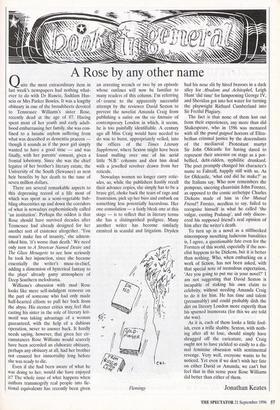A Rose by any other name
Quite the most extraordinary item in last week's newspapers had nothing what- ever to do with Dr Runcie, Saddam Hus- sein or Mrs Parker Bowles. It was a lengthy obituary in one of the broadsheets devoted to Tennessee Williams's sister Rose, recently dead at the age of 87. Having spent most of her youth and early adult- hood embarrassing her family, she was con- fined to a lunatic asylum suffering from what was described as dementia praecox though it sounds as if the poor girl simply wanted to have a good time — and was finally, with her parents' consent, given a frontal lobotomy. Since she was the chief legatee of her brother's literary estate, the University of the South (Sewanee) as next heir benefits by her death to the tune of seven million dollars.
There are several remarkable aspects to this depressing record of a life most of which was spent as a semi-vegetable bab- bling obscenities up and down the corridors of what is nowadays euphemistically called 'an institution'. Perhaps the oddest is that Rose should have survived decades after Tennessee had already designed for her another sort of existence altogether. 'You musn't make fun of insanity,' she admon- ished him, 'it's worse than death.' We need only turn to A Streetcar Named Desire and The Glass Menagerie to see how seriously he took her injunction, since she became essentially the writer's muse-in-chief, adding a dimension of hysterical fantasy to the plays' already gamy atmosphere of Deep Southern melodrama.
Williams's obsession with mad Rose looks like mere self-indulgent remorse on the part of someone who had only made half-hearted efforts to pull her back from the abyss. His sterner critics may, feel that casting his sister in the role of literary leit- motif was taking advantage of a woman guaranteed, with the help of a dubious operation, never to answer back. It hardly needs saying, however, that given her cir- cumstances Rose Williams would scarcely have been accorded an elaborate obituary, perhaps any obituary at all, had her brother not ensured her immortality long before she was ready to die.
Even if she had been aware of what he was doing to her, would she have enjoyed it? The whole issue of what happens when authors transmogrify real people into fic- tional equivalents has recently been given an arresting wrench or two by an episode whose outlines will now be familiar to many readers of this column. I'm referring of • course to the apparently successful attempt by the reviewer David Sexton to prevent the novelist Amanda Craig from publishing a satire on the vie litteraire of contemporary London in which, it seems, he is too painfully identifiable. A century ago all Miss Craig would have needed to do was to burst, appropriately veiled, into the offices of the Times Literary Supplement, where Sexton might have been found mulling over one of his acrid little 'N.B.' columns and shot him dead with a jewelled revolver drawn from her reticule.
Nowadays women no longer carry retic- ules, so, while the publishers hastily recall their advance copies, she simply has to be a brave girl, choke back the tears of rage and frustration, pick up her biro and embark on something less potentially hazardous. Her one consolation — a fairly bleak one at this stage — is to reflect that in literary terms she has a distinguished pedigree. Many another writer has become similarly enmired in scandal and litigation. Dryden
Flemings had his nose slit by hired bravoes in a dark alley for Absalom and Achitophel, Leigh Hunt 'did time' for lampooning George IV, and Sheridan got into hot water for turning the playwright Richard Cumberland into Sir Fretful Plagiary.
The fact is that none of them lost out from their experiences, any more than did Shakespeare, who in 1596 was menaced with all the grand guignol horrors of Eliza- bethan criminal justice by the descendants of the mediaeval Protestant martyr Sir John Oldcastle for having dared to represent their ancestor on stage as a pot- bellied, debt-ridden, syphilitic drunkard. The poet promptly changed his character's name to Falstaff, happily still with us. As for Oldcastle, 'what end did he make?' as the Italians say. Who now remembers the pompous, sneering chauvinist John Forster, as opposed to the comic archetype Charles Dickens made of him in Our Mutual Friend? Forster, needless to say, failed to recognise himself in what he called 'the vulgar, canting Podsnap', and only discov- ered his supposed friend's real opinion of him after the writer's death.
To turn up in a novel as a stiffnecked nincompoop mouthing ludicrous banalities is, I agree, a questionable fate even for the Forsters of this world, especially if the nov- elist happens to be Dickens, but it is better than nothing. Who, when embarking on a work of fiction, has not been asked, with that special note of tremulous expectation, 'Are you going to put me in your novel?' I am not suggesting that David Sexton is incapable of staking his own claim to celebrity, without needing Amanda Craig to do it for him. He has time and talent (presumably) and could probably dish the dirt on literary London more expertly than his spurned inamorata (for this we are told she was).
As it is, each of them looks a little fool- ish, even a trifle shabby. Sexton, with noth- ing after all to lose, should simply have shrugged off the caricature, and Craig ought not to have yielded so easily to a dis- mal feminine obsession with sentimental revenge. Very well, everyone wants to be noticed. Yet even if we don't wish her fate on either David or Amanda, we can't but feel that in this sense poor Rose Williams did better than either of them.
Jonathan Keates


















































































 Previous page
Previous page